
Re-education through labor, abbreviated laojiao was a system of administrative detention in mainland China. Active from 1957 to 2013, the system was used to detain persons who were accused of committing minor crimes such as petty theft, prostitution, and trafficking of illegal drugs, as well as political dissidents, petitioners, and Falun Gong followers. It was separated from the much larger laogai system of prison labor camps.
Human rights in China are periodically reviewed by international bodies, such as human rights treaty bodies and the United Nations Human Rights Council's Universal Periodic Review. The Chinese Communist Party (CCP), the government of the People's Republic of China (PRC), their supporters, and other proponents claim that existing policies and enforcement measures are sufficient to guard against human rights abuses. However, other countries, international non-governmental organizations (NGOs) including Human Rights in China and Amnesty International, and citizens, lawyers, and dissidents inside the country, state that the authorities in mainland China regularly sanction or organize such abuses.
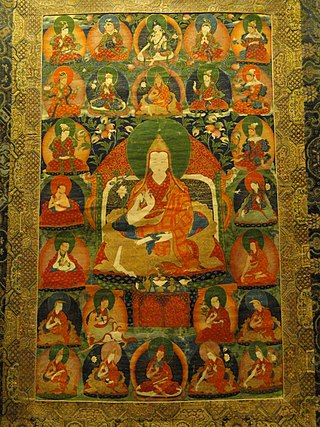
The 8th Dalai Lama, Jamphel Gyatso (1758–1804) was recognized as the 8th Dalai Lama of Tibet.
Free Tibet (FT) is a non-profit, non-governmental organisation, founded in 1987 and based in London, England. According to their mission statement, Free Tibet advocates for "a free Tibet in which Tibetans are able to determine their own future and the human rights of all are respected."

Larung Gar in the Larung Valley is a community in Sêrtar County of Garzê Tibetan Autonomous Prefecture, in Sichuan, China, known as Kham. Larung Gar is the local name for the community of mostly Tibetan and Han Chinese students which grew around the Serta Larung Five Science Buddhist Academy, founded in 1980 by Kyabje Khenchen Jigme Phuntsok. The residents are monks, nuns, vow holders and lay people. Larung Gar was considered the largest Buddhist monastic center until demolitions by the Chinese government recommenced in July 2016.

Takna Jigme Sangpo was the longest-serving political prisoner of Tibetan ethnicity, having spent 37 years in a prison near Lhasa.

Palden Tenpai Nyima (1782–1853) was the 7th Panchen Lama of Tibet.
Administrative detention is arrest and detention of individuals by the state without trial. A number of jurisdictions claim that it is done for security reasons. Many countries claim to use administrative detention as a means to combat terrorism or rebellion, to control illegal immigration, or to otherwise protect the ruling regime.

Dolma Kyab, born in 1976, is a writer and teacher in his native Tibet. He was imprisoned at Chushur Prison, which is located in a rural area south-west of his native home, Lhasa, Tibet. On March 9, 2005, he was arrested in Lhasa at the middle school where he was employed as a history teacher. On September 16, 2005 he was convicted and sentenced to 10 years in prison by the Lhasa People’s Intermediate Court for the crime of stealing and/or passing on “state secrets.”
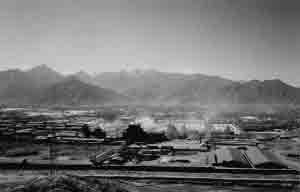
Drapchi Prison, or Lhasa Prison No. 1, is the largest prison in Tibet, China, located in Lhasa. Drapchi is named after its location and was originally a military garrison until it was converted into a prison after the 1959 Tibetan Uprising. It is roughly one mile from the city centre and is the main prison for judicially sentenced prisoners in Tibet. It was the primary place for the detention of political prisoners before 2005 when the newer and modernised Chushur Prison was built. Drapchi also goes by the name Delapuxie prison, which has sometimes been listed as a separate prison online.
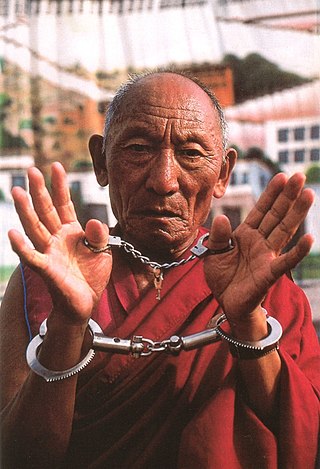
Palden Gyatso was a Tibetan Buddhist monk. Arrested for protesting during the Chinese invasion of Tibet, he spent 33 years in Chinese prisons and labor camps, where he was extensively tortured, and served the longest term of any Tibetan political prisoner. After his release in 1992 he fled to Dharamsala in North India, in exile. He was still a practicing monk and became a political activist, traveling the world publicizing the cause of Tibet up until his death in 2018. His autobiography Fire Under the Snow is also known as The Autobiography of a Tibetan Monk. He was the subject of the 2008 documentary film Fire Under the Snow.
Khawa Karpo Tibet Culture Centre Charitable Trust is a non-profit organization that was founded on 16 April 2009. The organization is based in Dharamshala in Himachal Pradesh, India.
Human rights in Tibet has been a subject of intense international scrutiny and debate, particularly since the annexation of Tibet by the People's Republic of China. Before the 1950s, Tibet's social structure was marked by inequality and described as a caste-like system or, controversially, as serfdom. Severe punishments, including permanent mutilation of body parts, were common, although capital punishment was banned in 1913. Muslim warlord Ma Bufang caused widespread destruction and deaths in Amdo, which is located northeast of Central Tibet.
The Tibetan Centre for Human Rights and Democracy (TCHRD) is a Tibetan non-governmental nonprofit human rights organization.

Jigme Gyatso (aka Golog Jigme) is a Tibetan filmmaker and human rights activist. After assisting with the documentary Leaving Fear Behind, he was arrested by Chinese authorities on at least three occasions. He alleges that he was tortured following his March 2008 arrest.
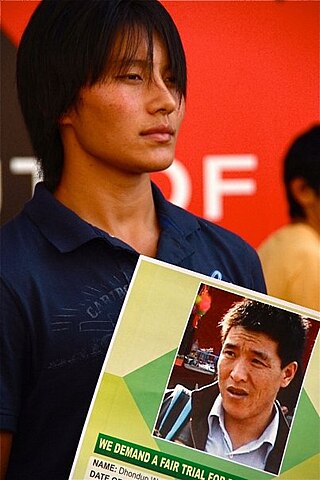
Leaving Fear Behind, also known as Leaving Fear behind: I Won't Regret to Die, is a documentary movie from Dhondup Wangchen and Jigme Gyatso about communist Chinese repression of Tibet. It was premiered in 2008 in the year when the 2008 Summer Olympics took place in Beijing, China.
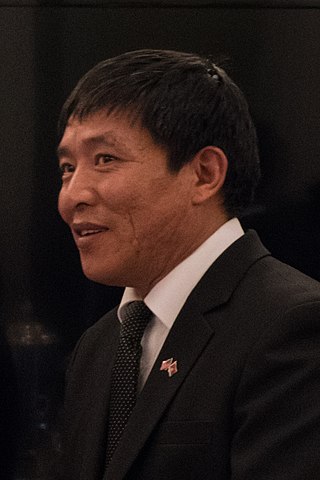
Dhondup Wangchen is a Tibetan filmmaker imprisoned by the Chinese government in 2008 on charges related to his documentary Leaving Fear Behind. Made with senior Tibetan monk Jigme Gyatso, the documentary consists of interviews with ordinary Tibetan people discussing the 14th Dalai Lama, the Chinese government, the 2008 Beijing Olympics, and Han Chinese migrants to the region. After smuggling the tapes of the interviews out of Tibet, however, Dhondup Wangchen and Jigme Gyatso were detained during the 2008 Tibetan unrest.

Jigme Gyatso is a Tibetan activist of the Tibetan Independence Organisation who, in 1996, was sentenced to 15 years in prison on charges of "leading a counter-revolutionary organisation" and "inciting splittism". Two more years were added to his sentence in 2004 when he protested in jail. Several international human rights groups have protested or campaigned on his behalf, and Amnesty International has designated him a prisoner of conscience.

Lukar Jam Atsok or commonly Lukar Jam, born 1972, in Tsolho Dragkartri district, in Amdo, Tibet. He is a Tibetan refugee and political activist that ran for Prime Minister of the Tibetan Government-in-Exile in Dharamshala, India in 2016. A former Chinese political prisoner, Lukar Jam went on to become President of the non-profit Gu-Chu-Sum, dedicated to the welfare of Tibetan political prisoners. He has worked as a civil servant with the Tibetan Government-in-Exile and currently lives in the Tibetan enclave of McLeod Ganj, high above Dharamsala, India in the western foothills of the Himalayas.

Antireligious campaigns in China are a series of policies and practices taken as part of the Chinese Communist Party's official promotion of state atheism, coupled with its persecution of people with spiritual or religious beliefs, in the People's Republic of China. Antireligious campaigns were launched in 1949, after the Chinese Communist Revolution, and they continue to be waged against Buddhists, Christians, Muslims, and members of other religious communities in China.